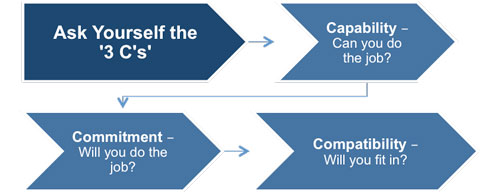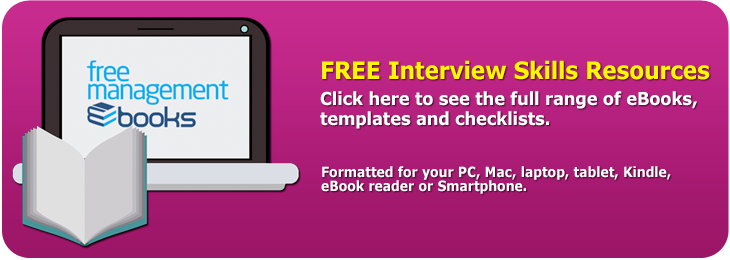Management Interview Preparation
Almost everyone will have had the experience of being interviewed even before they go for their first management job. It may have been an interview for a school or college place or an informal interview for a part-time job. If you've already been employed and you're looking to move to another organization for some reason then you'll already have been through the interview process and you'll know more or less what to expect. If that is not the case then you may wish to read an introductory book on interviews before reading further.
Before getting down to the specifics of answering management interview questions there are some things you should do before you agree to the interview. As a bare minimum, you should look at the organization's website, mission statement, and any promotional literature that you can find. Not only does this information help you to frame your answers in the interview, it can help you to focus on the culture and values of the organization and to decide whether or not they are compatible with your own.
Following on from this, you need to be absolutely clear in your own mind that the job itself is right for you. If you put yourself forward for a job that doesn't suit your knowledge, skills, and aptitudes then you are setting yourself up for a stressful and unpleasant interview. It's perfectly OK to be ambitious and to want to stretch yourself, but if you apply for a job that does not play to your personal strengths then you will find yourself having a miserable interview as your unsuitability is highlighted again and again.
Quite often, when someone has had a really bad interview, they blame the interviewers for 'asking the wrong questions' and then following up aggressively when they didn't get the answers they wanted. The truth is that the interviewers were asking the right questions, but the wrong person was answering them. Always do as much research as possible and make sure that you only apply for jobs where the organization and the job itself match your skills and abilities.
It is also a good idea to check the trade press and the financial press, because the last thing you want to do is to take a job at an organization that is about to be go bust, be taken over, or have its funding slashed. This may sound obvious but many organizations carry on their recruitment operations as normal even when these things are about to happen. As a consequence, thousands of people every year find themselves joining an organization that is undergoing some sort of upheaval that leaves them either facing redundancy or doing a different job from the one they applied for.
Most of the things that determine whether an interview is a positive experience or an ordeal are decided well before the interview itself and depend on what you do in the preparation phase. If you spend your preparation time poorly then you will have some bad experiences that will lower your confidence and make you increasingly stressed in future interviews. This can quickly degenerate into a negative feedback loop, in which you perform badly because your confidence is lacking, and this undermines your confidence still further.
The level of competition for management roles is high so you want to pick those opportunities that you are best placed to win. This means taking the time to assess your compatibility with the role and the organization. You will then be able to focus on the opportunities where you are most suited to succeed.
 |
Being honest about your skills and competencies will help you select the opportunities that you are most suited to. Answering the 'Three-C's' questions (Capability, Commitment, and Compatibility) can help you to judge your suitability for the role and the organization.
Capability - Can you do the job?
Do your skills, knowledge, and experience give you the capacity to fulfill the tasks required by the role? Does your track record support this? Do you feel confident in your own abilities?
Commitment - Will you do the job?
Do you have the motivation to do the job? Are you hard working and committed? Are you the kind of person who will do more than just what is in the job contract?
Compatibility - Will you fit in?
Do you feel positive about the organization and what it stands for? Do you share its values? If you find yourself at variance with your potential employer's value system then you would probably be advised to look elsewhere. It is almost impossible to succeed in a culture that feels alien to you.
 |
Many interview books discuss these factors in terms of how to answer interview questions, and they are important in that context but you can save yourself a lot of grief by considering them carefully before you even apply for a job.
Even if you believe that you are sufficiently capable, committed, and compatible, does your employment record support this view? This is an important point because the interviewer will be looking for evidence and if it does not appear in your employment record then you could be in for an ordeal when the questioning starts.
All of the above should make you realize that it is a better strategy to restrict your applications to jobs that you are well suited to and where you do have a reasonable chance of success. It's better to apply for a few suitable jobs and to prepare properly than to apply for dozens, prepare poorly, and hope for a lucky break. The first strategy will give you a high interview to application ratio, some good interview experiences, and hopefully a job. The second strategy will give you a low interview to application ratio, some bad interview experiences, and you may even find yourself in the 'wrong' job.
The quality of your preparation prior to an interview is the single biggest factor in making the actual event a positive and successful experience. It also ensures that you have done all you can to avoid accepting a role within an organization that is under threat of takeover or closure.
You may also be interested in:
Management Interview Preparation | Preliminary Interviews | Using a Recruitment Agency | Understanding the Role Description | Matching Competencies to Role Responsibilities | Matching Competencies Example.


